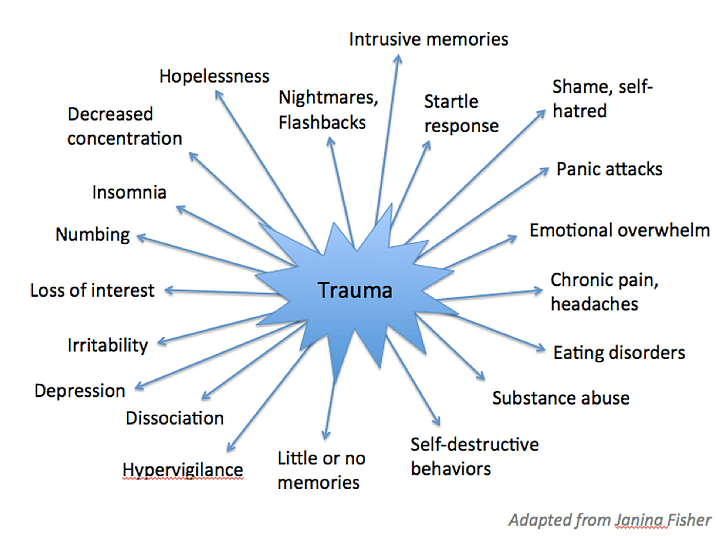Are you struggling to overcome the residual effects of a traumatic event in your life? It is possible that you are experiencing Post-Traumatic Stress Disorder (PTSD). PTSD treatment with an experienced counselor can be key to overcoming the effects of trauma and Terra Counseling Center is happy to help in this area. We offer a variety of counseling services, including trauma therapy, in Miami and we have helped many individuals just like yourself develop the tools and skills needed to move beyond the trauma in their lives. Contact us today to learn more. In the meantime, continue reading to learn more about trauma.
Trauma 101
What Is Trauma?
Emotional trauma is most simply defined as a response to a deeply distressing and disturbing experience or event*. The response can feel overwhelming, make the person feel helpless, and decreases one’s ability to feel emotions and other experiences fully.
*Examples of traumatic events include being in or witnessing an accident, physical, and/or sexual assault, community violence such as being bullied or school shootings, war or political violence, serious or life-threatening injury, sudden death or illness of a loved one, and natural disasters. Often times, traumatic responses develop in response to sudden or significant shifts in one’s life, such as separation and/or divorce, loss of a job or expected future, and loss of family or country. The actual response and related distress is unique to each individual.
How Do We Know If We Are Affected By It?
People who have experienced traumatic events will appear shaken and disoriented and they may not respond to conversation as usually as they do. Some signs and symptoms of psychological trauma include confusion, difficulty concentrating, mood swings, anxiety, depression, and intrusive thoughts, among others.
Trauma can result from an event that occurred once, after a few times (more isolated incidences), or from events that occurred over a prolonged period of time. Consultant and psychotherapist Janina Fisher, Ph.D. cites that survivors of trauma have symptoms, not memories. These symptoms are unique to each person and are illustrated below to the right.

People who have undergone trauma can experience major shifts in their emotions, their ability to attend and be in the moment, and in their self-concept. Changes in emotions include difficulties regulating anger as well as self-destructive behaviors, including unhealthy patterns related to food, substance use, and hurting oneself to relieve pain. Difficulties with attention and being in the present include memories of traumatic events that intrude in your everyday life, feeling mentally disorganized and feeling detached from one’s own body and mind. Changes in self-perception include a consistent sense of guilt and responsibility (self-blame), feeling ashamed, and feeling ‘different’ from others, such as a sense of uniqueness, feeling utterly alone, and that others just don’t understand.
Other shifts include difficulties in relationships, such as trusting others and with feeling connected, where a sense of intimacy is lost or never felt. There is also a feeling of isolation and withdrawal and repeated attempts to protect oneself from being hurt that are unsuccessful. People can also experience symptoms in their bodies that cannot be explained by medical professionals. Lastly, one can lose faith in others and oneself, contributing to hopelessness and despair.
Why Seek Trauma Therapy?
Shifts in mood, behavior, self-concept, and relationships related to trauma could have taken place in childhood, adolescence, or adulthood. Certain aspects could feel like they are an integral part of who you are while others can be experienced as something relatively foreign that are difficult to comprehend, leaving a feeling of confusion and doubt. One may also have learned to relate to others in ways that are similar to their past experiences where others were unresponsive, hurtful, or emotionally unavailable. Such ways of relating can interfere in one’s ability to connect with others and to be helped (difficulties asking for help, receiving help, or behaving in ways that may elicit others to reject them).
Psychotherapy allows the person to explore these aspects and how they have become part of your everyday experience. The aspects that feel foreign and unwelcome as part of your life’s purpose can be mutually worked through and better understood with your therapist to establish a feeling of safety, self-awareness, and support that may have previously felt impossible to imagine.
According to the American Psychological Association (APA) and the National Institute of Mental Health (NIMH), Post-Traumatic Stress Disorder has short and long term effects, but fortunately psychotherapeutic intervention and PTSD treatment can help reduce the effects of the condition.
Trauma Therapy and PTSD Treatment in Miami
Need help working through the effects of trauma in your life? Contact Terra Counseling Center today to learn more about our trauma therapy and PTSD treatment.
References
Fisher, J. (2016). Retrieved from http://janinafisher.com
Herman, J. L. (1992). Trauma and recovery: The aftermath of violence. New York: Basic Books.
van der Kolk, B. A. (2001). The assessment and treatment of traumatic stress. In Rachel Yehuda (Ed.), Traumatic stress. American Psychiatric Press.
